
632K
Downloads
296
Episodes
Surround yourself with somewhere else. Captured quiet from natural places. Put the ”outside on” with headphones. Find us on Bluesky @RadioLento. Support the podcast on Ko-fi.
Surround yourself with somewhere else. Captured quiet from natural places. Put the ”outside on” with headphones. Find us on Bluesky @RadioLento. Support the podcast on Ko-fi.
Episodes
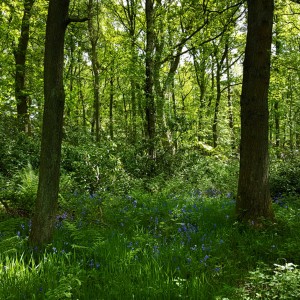
Saturday Jun 12, 2021
Wading cows and a passing cuckoo - the lakes and woodland of Chatsworth
Saturday Jun 12, 2021
Saturday Jun 12, 2021
Mid-afternoon. June hot. An overgrown track on the Chatsworth Estate, close to the peaceful lakes above the house, between meadows and dense woodland. An abundance of fresh hoof marks. A route used not by people, but by livestock changing fields. Hedgerows scent the quiet air with pollen. Cow parsley, moist nettles, something like aniseed. Nobody is around, so we leave the microphones behind to record, on the trunk of a tree facing straight into the sound vista.
Through the tall trees, beneath the loudly singing birds, come the echoes of cows. Knee deep and wading. Splashing and wallowing in the cool shallows.
With us gone the true sound of the woodland is revealed. An infinite humming, of bees and countless tinier insects. It can, if we let it, grate with modern taste, but it is a key barometer of life. Humming is a sound-measure of biodiversity, and the louder it is, the healthier the ecosystem. This is a well place.
The birds and the insects and the wallowing cows are, with the woodland and the lake, basking in the summer heat. And then, at nine minutes, the thing we never thought could happen...
A magic spell. A sonorous rocking call.
A simple pair of musical notes, that flow through the air with a special kind of wistful purity.
A cuckoo. All-too fleeting. But a cuckoo. Flying.
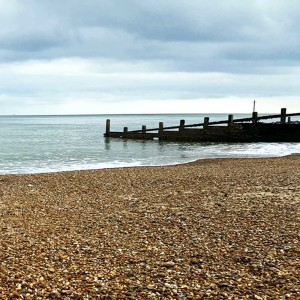
Saturday Jun 05, 2021
70 - Blue sky. Empty beach. Low tide.
Saturday Jun 05, 2021
Saturday Jun 05, 2021
It's past midday on a late May day in Suffolk and the sun is pouring down onto a calm sea. It's shining, for the first time this year, with that summer strength that makes you stop, to really take in the moment. It's perfect, here at the shoreline, not far from where the River Deben joins the sea, the beaches a mix of shingle and soft sand.
Listen.
There's no wind.
No on-shore breeze.
Nothing to cuff the ears or muffle the sound that washes to and fro here at the boundary of low tide.
Hear the mesmerisingly detailed and spatial sound which shallow waves make as they break and dissipate. Break, and dissipate.
A propeller plane. The grey outline of a container ship on the horizon. Sailing away. Under full steam, out into the North Sea. With each new wave, its grey box-like outline shrinks, and recedes. A giant hulk, no bigger than a fingertip. A few waves more, until it dips out of sight.
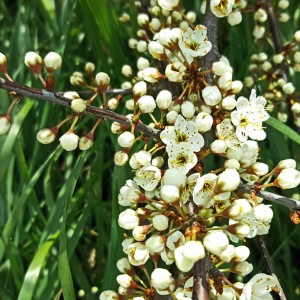
Saturday May 29, 2021
Time beside a stream in the Welsh hills
Saturday May 29, 2021
Saturday May 29, 2021
A fair April day has dawned up in the hills above the village of Kerry. Nothing's come or gone yet along the road beside the stream. Nature's curfew means its dew tinted tarmac must stay empty for a little while longer, to let the stream have its say and give the scattered strands of meadow grass a chance to be blown back into the hedgerows. Silently and invisibly to the ear, the road waits, winding down into the valley through woods and open fields, almost all of the way. Intertwined and accompanied by the music of the stream.
Up here in the hills, the air is cool and pristine fresh. Soon the morning sun will have lifted away the last of the night's chill. A distant cockerel crows amongst birds in full song. Their sonorous voices ring out over the landscape, pure, unfettered by human noise. One flies down to the stream. Tiny wings beat the air. Then gone, quick as a dart. A short creaky call echoes. A roaming pheasant, sounding like an unoiled garden gate. When near the sheer effort can be heard to judder the air.
The stream runs steadily, hidden out of sight along the bottom of a steep brambled gully about ten feet below the level of the road. This section is thickly wooded with weather beaten trees. Far from habitation and almost knee-deep with leaf litter, it's a safe home to birds and ground living wildlife, and a wonderful place to experience the sound of the landscape.
-----------------------------------------------------------------------
This is the fourth episode from this lovely spot near the Kerry Ridgeway. Explore them all via this blog post.
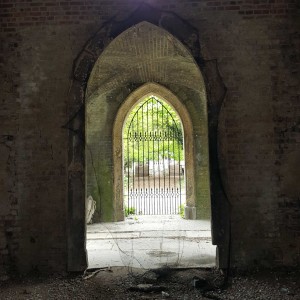
Saturday May 22, 2021
Birdsong in rain from inside the derelict chapel at Abney Park nature reserve
Saturday May 22, 2021
Saturday May 22, 2021
There's a special feeling that comes with the sound of falling rain. With a sky still free of jet planes, this is how the day unfolds within the secret space of the derelict chapel of Abney Park. It is first thing in the morning, when the birds begin to sing and the trees change from dark shadow into green.
Set within dense woodland in the north east of London, barred and padlocked against vandals, this architecturally significant chapel hollowed out by fire thirty years ago, now stands on the cusp of restoration. It's a dissenting gothic structure that aligns and appreciates the natural landscape, and whose 120 foot spire, still visible above the veteran pines, signifies to all around that below lies an oasis of calm within the city. Since its dereliction, the chapel has witnessed ten thousand dawns. This is just one of them. One glorious section of time captured by a pair of microphones left alone to record inside the chapel, underneath nesting birds.
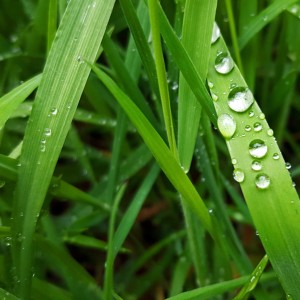
Saturday May 15, 2021
May rain after daybreak
Saturday May 15, 2021
Saturday May 15, 2021
It must have broken through a mist of spring rain when it came, the dawn, the first light of day. It would have come into a watery sky too, one busy with clouds, but full of blossoming spring and still clean, free of jet planes. The birds will have seen it coming, long before. In fine voice they sing from the mid-distance like in a dream, reflected off so many back garden walls. None in this back garden though, with its wide hanging tarpaulin, tumbled stacks of empty flowerpots, upturned planters, and old paint tins. The timpani, for when the rain drops fall.
They know what they're doing, the birds. They watch the rain clouds from their sheltered perches and wait for them to pass. They wait for the water to soak into the grass, and bring up the worms. They bide their time.
As they wait, the city hums, quietly. It isn't quite ready yet. The rain showers down, in fine mists and spray. It falls between the birdsong onto the tarpaulin, onto the upturned pots, the countless leaves and blades of grass. And as it lands, it lights up the garden, in sound. Plays upon the upturned pots and tins, taps like a million fingertips on the tarpaulin, gathers, then with a lifting wind streams off onto the yard floor in splatters. This is how a little garden sounds at dawn, when the rain falls. When there's no one around to hear it.
-----------------------------------------------------------------------------
Like this episode? Please give us a like, review or share wherever you get your podcasts or on Twitter. You can also support us on Ko-fi to help us keep going - buy lovely cards or buy us a coffee.
Thanks for listening.
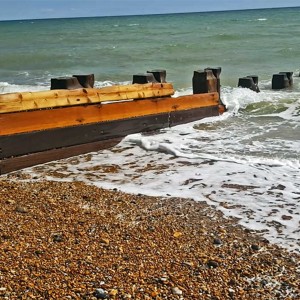
Saturday May 08, 2021
Listening to the longshore drift
Saturday May 08, 2021
Saturday May 08, 2021
There's a point along the promenade at Bexhill-on-Sea where the pull of the crashing waves outweighs the ice cream hubbub underneath the pavilion. Where no matter your age, you'll find yourself leap from the walkway and begin the short steep shingle scrunching journey down towards the sea. It's a point, buffeted by a salt-scented onshore breeze, that has no need for sign or marker. No need for a call or shout. A turn-off, from the flat walkway, where you simply follow the invisible tracks of everyone who's ever been, and fall headlong into your own childhood dream. We saw in the distance a man walking across the beach with his child, a kite bobbing in the sky in front of them. We jumped down. We strode in giant steps steep down the shingle. We followed the old wooden groyne and stopped when it stopped, at the water's edge, beside the foam fizzing waves. Standing so near to the surf zone we could feel it. The weight of the sea. Thudding the shingle through our feet. How can anything matter in the face of such weight and movement? We could hear the waves rolling in, interlacing, unfurling and breaking. Swooshing in from left to right, pushed by force of current and prevailing wind. This is the sound of longshore drift. The reason the beach is bisected by groynes. We listened, and marvelled, at the gloriousness of the waves as they raced up the beach to meet us.
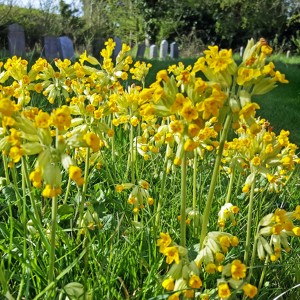
Saturday May 01, 2021
65 Songs from the churchyard of St Mary’s Gilston
Saturday May 01, 2021
Saturday May 01, 2021
The parish church of St Mary, Gilston in Hertfordshire dates from the 13th century. It is set within wide open farmland north of Harlow. It's one of only a handful of buildings, surrounded on all sides by fields and outcrops of old trees, left behind from when the land was cleared for farming. As we walked along the narrow lane away from Eastwick, thickly verged and wafting with spring flowers, we listened as the noise from the A414 gradually subsided behind us, and dwindled with each turn in the lane, until at last it was nothing.
It was then that we felt real quiet, and heard the skylarks. High and rising over the fields, slowly circling on the warm updrafts. Singing out that from up there they could see whole fields of yellow.
The porch entrance to St Mary's has two wooden benches. A stack of second-hand books, parish notices pinned to the board, warnings to would-be heritage thieves, dog bowls full of water for passing pooches and a box of hand-drawn pathway maps, free to take away. It is the perfect spot to stop and take in the atmosphere. The sound of a sleepy rural church, adorned with sedately cooing wood pigeons basking on its sun warmed slates.
The sound of the overgrown churchyard with its gravestones surrounded by a carpet of cowslips, looking up to be read. Chaffinches and seesawing great tits in full voice from all over, hidden in the hedgerows.
At the far end of the churchyard, just before the fields start, a fir tree sways in the breeze. Jovial. Breathing in the wind. Home to a gloriously country-toned blackbird, who flew back to sing for a while.
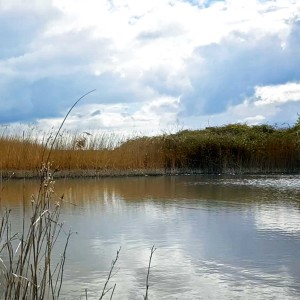
Saturday Apr 24, 2021
Waiting for skylarks at the Rye Harbour nature reserve
Saturday Apr 24, 2021
Saturday Apr 24, 2021
If I sit here, very still, so as not to scare the water birds, might they come back? I hope so. They've wheeled away again, like they do. It's their drifting altitudinous song that I most want to hear. Sparse clouds are hurrying by. When the sun is out, it's surprisingly strong. It makes the air smell of warm grass. A sea breeze is blowing. Swishing in, from left to right through the tall stems. This spot is only a few hundred yards from the crashing waves of the sea, but a steep shingle ridge softens the sound into almost nothing.
It's quiet. Birds are all around, mostly in the mid-distance. A wader that's been sploshing along the shallow edge searching for food has come closer. It seems unperturbed. Does it know I'm here?
As I wonder I start to hear them. It is them. They're coming. The skylarks are wheeling back, beginning to unfurl their cornfield-yellow string of audible bunting across the sky above me once again. I drink their sound in. The simple timeless beauty of them. My body eases into a state of complete rest.
From somewhere behind, on a track that bisects the nature reserve a car bumps slowly by. A minute later a heavy truck follows. Clanking metalwork over deep ruts. It sounds like it's out of a film set in the Australian Outback. It stops, turns around, then clanks back off into the distance, the way it came.
As it goes it draws a long and dusty spatial line across the sound landscape, reminding me this is a vast land, on the edge.
The skylarks continue to wheel. Two geese fly by. A migrating swallow makes landfall.
-------
Follow us on Twitter to see more pictures from this special place.
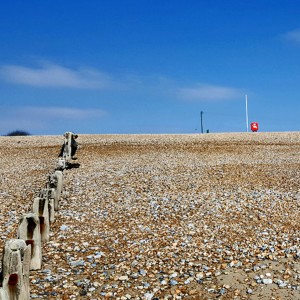
Saturday Apr 17, 2021
Taking forty winks at the seaside - Norman's Bay, East Sussex (sleep safe)
Saturday Apr 17, 2021
Saturday Apr 17, 2021
The perfect spot for a snooze on a windy beach is the leeside of a shingle berm. Sheltered from the onshore breeze, you can't see over to the sea, but you can hear it, with all its wholesome sound. You can feel it too. The vast gravitational swell, the ever alternating push and tow. It's why the sea changes the rules of everything. Even time. Just below the crest of the berm, the roar of the breakers is quelled. Cushioned into comforting rumbles, topped with white swishes. Basking in this safe and soporific place, there's no need for words. No need to think, plan, or worry. For this little bit of timeless time, it's just you, the berm, and the sea.
Families crunch by over the shingle, their voices lost in wind. Time passes. A loose shell tinkles. Towards the end, water from the advancing breakers can be heard trickling through the berm. A propeller plane gently flies over. It's heading west, towards Eastbourne.
This is a sleep safe episode. There are no loud or unexpected noises.
-------------------------------------------------------------------
Shingle beaches form steep ridges called berms. They show the lines of the high tide and the storm tides.
Explore more soothing episodes from beside the sea.
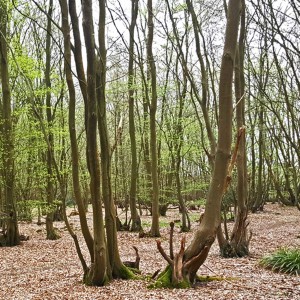
Saturday Apr 10, 2021
Mistle thrush sings amongst wind hushing conifers
Saturday Apr 10, 2021
Saturday Apr 10, 2021
- The air above Broxbourne Wood is moving steadily, pushed along by an early April wind. It's catching the tops of the tall brush-like conifers abundant in this part of the wood. They're all about, and pointing up into the sky, and all hushing, in slow, sympathetic waves. It's a therapeutic sound that helps to open the lungs, and ease the mind. Down here on the forest floor it's quiet. Just the fleeting voices of children playing somewhere else deeper in the wood. A bumble bee comes, then goes, and there's a mistle thrush. A mistle thrush whose jaunty song echoes throughout the vast empty space beneath the trees. It's like a blackbird, but sings in shorter form, and has a lighter, more effervescent voice. For us the mistle thrush spells the joyful arrival of spring. We love to hear it this time of year. It's a bright afternoon. The clouds have thinned almost to nothing and the sun is about to come out. Time for a flask of tea. We attach the microphones to the trunk of a tree and leave them alone to capture the beautiful ambience of this rural Hertfordshire wood.
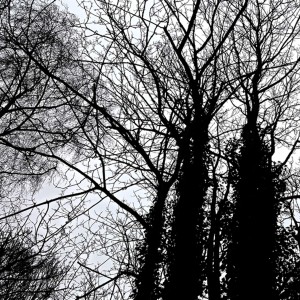
Saturday Apr 03, 2021
A city at low tide (sleep safe)
Saturday Apr 03, 2021
Saturday Apr 03, 2021
It is said that cities never sleep, but from inside north east London's Abney Park nature reserve, the silken hum tells a different story. It's the early hours of Christmas Day 2020. The park has long since closed. Nothing is about. From part way up the trunk of one of the many ivy-clad trees, the microphones are recording. Capturing the murmurations of the city at night. The traffic has retreated. The torrents of noise have shallowed. An urban sprawl that's gone out to the horizon. This is the sound of the city at low tide. The indeterminable rumble has thinned, to a soft hum. A panoramic hum that shifts, and billows, like curtains of audible silk. It's sometimes lost amongst the hiss and rustle of the ivy. A fox barks. An undulating tone fades in and out. Somewhere off, an unsteady bough squeaks, like a rusty garden gate. Lone cars pass in long hushing waves. Near to the microphones ivy leaves rustle. Then, is that something singing from through the leaf bare trees? Is it a silvery glimpse of dawn? It is a robin. But it's only dreaming. Dreaming out loud, of tomorrow's song.
Explore our other episodes recorded from Abney Park.
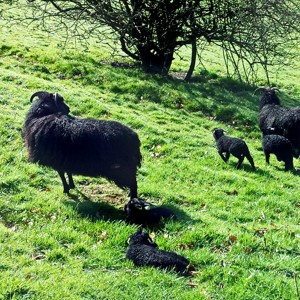
Saturday Mar 27, 2021
Soundscenes of spring from the Derbyshire hills
Saturday Mar 27, 2021
Saturday Mar 27, 2021
Nestled between high gritstone walls, just off a single track lane about 1000 feet up in the Derbyshire hills, there's an old farmhouse with a chicken coop. Hidden under tall trees it has a panoramic view over the valley. On an early April day in 2018 when the barometer was high, when a blue sky stretched over and the air had that invigorating sniff of rain-washed agricultural land, we left the microphones in an elderly apple tree to record the sheep, the birds and the valley for a few hours. The tree was one of a pair that have stood there opposite the farmhouse for perhaps half a century or more. They stand like an admiring couple, taking in the view. From this beautiful spot they must have witnessed fifty springs, and thousands of new born lambs. These soundscenes feature hens and a cockerel, cows, sheep and lambs. Assorted garden and moorland birds assemble - chaffinches, jackdaws, rooks and robins, blackbirds, black caps and a pheasant. This is also the sound of the sky as we knew it pre-lockdown. Threaded with aircraft, including some long humming lazy propellers. We hope we can get back soon after restrictions are lifted to re-record this soundscape.
**This is our 60th episode and marks our first birthday. We launched in lockdown on 29 March 2020 and have been sharing weekly sound postcards to work or rest to ever since. Please help us keep going. Buy us a coffee and / or get some lovely Lento cards to brighten your day or someone else's. Support Radio Lento on Ko-fi. Thanks for listening. **
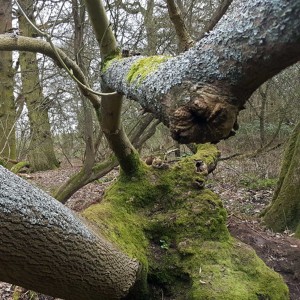
Saturday Mar 20, 2021
A fallen tree on Galley Hill
Saturday Mar 20, 2021
Saturday Mar 20, 2021
It was, from a bridleway in rural Essex, the long slanted beam that first attracted us over for a better look. A fallen tree, perpendicular to the rest, lying half in and half out of a patch of woodland. We'd been trudging over claggy footpaths for an hour and it was coming on to rain. We needed to stop moving, and properly take in the landscape. The beam formed a natural bench, and something to climb on. After our ears had adjusted, we realised much of the human noise in the landscape was gone. The M25 to the south, and a road called the Crooked Mile which separates the edge of the Lee Valley Park and open country, had both sunk below the horizon. This spot was an oasis for listening. A place to enjoy the early spring sound of the local wildlife, and the rising and falling of the wind in the trees. Leaving the microphones behind on the tree trunk to record for a while, we went back to the bridleway, just to see where it went.
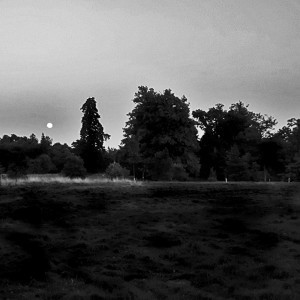
Saturday Mar 13, 2021
Suffolk Wood (part 7) 2am - counting the chirps of a dark bush cricket (sleep safe)
Saturday Mar 13, 2021
Saturday Mar 13, 2021
When the bell of St Mary's strikes 2am, and the world has dissolved into shadows and echoes of far away things, there's a solace to be found in counting the chirps of a dark bush cricket. When all that is near is a loose twig falling, a small mammal, biding its time between a fleeting moment of stealth, and the semblance of a nocturnal breeze seems to be somewhere around, high up in the trees, there is a reason to let go of the urge to track time. Let the night planes take it. Let them draw it away in their soft rumbling arcs, away and over the dark curve of the Earth. And don't worry. They'll be sure to leave it where you can find it. It'll be there when you arrive. There on the cusp of dawn. Here, in this rural Suffolk wood, in this safe and empty place, on this calm August night when thoughts can be let go to float down into the leaves, its the trees who'll stand over.
This is a very very quiet episode. An hour of stillness and peace. It is sleep safe. Listen with headphones to get the full sound.
This is the seventh episode from this lovely location. Here's a blog post about Suffolk Wood which lists them all, so you can listen in order and hear how the sound of one night changes.
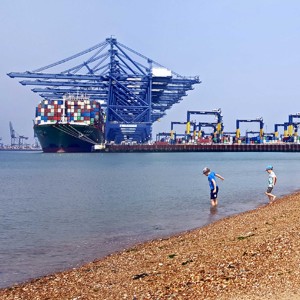
Saturday Mar 06, 2021
Seaside brutalism - at the Port of Felixstowe
Saturday Mar 06, 2021
Saturday Mar 06, 2021
On the beach, sat within wetting distance of the water's edge, there's a point where the noise from the container port begins to meld in with the shingle soft washing to and fro of the waves. Here, about a quarter of a mile away, towering gantry cranes can be seen whining backwards and forwards, deftly hoisting lorry-sized containers like little matchboxes from an impossibly vast supership. Venus, mega-sized, operated by China Shipping Container Lines, and with a warehouse-sized engine and chimney that throbs and pulsates the sea air for miles around. On this, a weekday last summer, the port and all of its rumblings form nothing more than a backdrop to what beaches are really for. Playing. Oblivious children constantly on the move run soaked and delighted to their families before rushing back to get ankle-deep in the waves again. Parents warn there's a stranded jellyfish, while claxons and two-tone sirens announce the peril of yet another swooping crane, on the horizon. There's a jagged beauty to all of this, a form of shoreline brutalism.
It is quieter up coast, around Languard Point and past Felixstowe town, where we also recorded that summer. You can hear these soundscapes in episodes 25 (Cooling off beside sifting waves at Felixstowe Ferry - 32mins) and 33 (Champagne shingle on Felixstowe beach - 19mins).
If you like brutalist soundscapes, we have more for you to explore.
